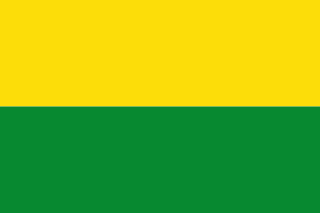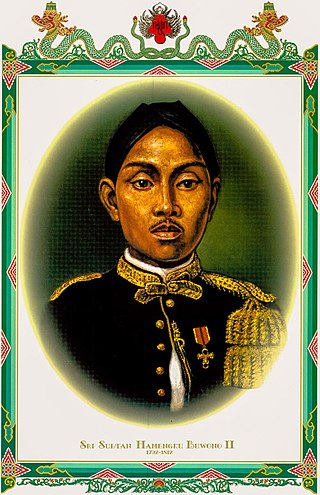
The Sultanate of Mataram was the last major independent Javanese kingdom on the island of Java before it was colonised by the Dutch. It was the dominant political force radiating from the interior of Central Java from the late 16th century until the beginning of the 18th century.

Sri Paku Alam VIII was Prince of Pakualaman serving as the second Governor of Yogyakarta. He was the son of Paku Alam VII and Gusti Bendara Raden Ayu Retno Poewoso. His child's name was Gusti Raden Mas Harya Sularso Kunto Suratno and his adult name was Kanjeng Gusti Pangeran Adipati Arya Prabu.

Sri Sultan Hamengkubawono X is the Sultan of the historic Yogyakarta Sultanate in Indonesia and is currently also the Governor of the modern Yogyakarta Special Region.

Kraton or keraton is a type of royal palace in Java, Indonesia. Its name is derived from the Javanese ka-ratu-an meaning residence of the ratu, the traditional honorific title for a monarch. In Java, the palace of a prince is called pura or dalem, while the general word for palace is istana, which is identical to Malay.

Sultan Agung Adi Prabu Anyakrakusuma, commonly known as Sultan Agung, was the third Sultan of Mataram in Central Java ruling from 1613 to 1645. He was a skilled soldier who conquered neighbouring states and expanded and consolidated his kingdom to its greatest territorial and military power.

The Sultanate of Yogyakarta, officially the Sultanate of Ngayogyakarta Hadiningrat is a Javanese monarchy in Yogyakarta Special Region, in the Republic of Indonesia. The current head of the sultanate is Hamengkubuwono X.

Hamengkubuwono I, born Raden Mas Sujana, was the first sultan of Yogyakarta. He reigned from 1755 to 1792. He has been elevated as a National Hero of Indonesia since 2006, because of his fight against the Dutch at that time and establishment of Yogyakarta.

Kanjeng Pangeran Harjo Notoprojo, also known as Tjokrowasito, Wasitodipuro, Wasitodiningrat, among other names, was one of the most highly respected performers of Javanese gamelan. He led the Paku Alaman palace gamelan as well as the gamelan for the Radio Republik Indonesia Yogyakarta, and taught gamelan in universities around the world. He was also a noted composer and rebab performer.

Pakubuwono X was, despite his regnal name, the ninth Susuhunan (Monarch) of Surakarta. He reigned from the 1893 to 1939, making him the longest reigning Sunan in the history of Surakarta.

The Principality of Pakualaman is a minor Javanese princely state within the Sultanate of Yogyakarta. It was created in 1812 when Natakusuma was rewarded for helping the British quell the conflict in Yogyakarta in June 1812. It became the mirror image of Mangkunegaran in the territory of the Surakarta Sunanate.

Hamengkubuwono IV, also spelled Hamengkubuwana IV was the fourth sultan of Yogyakarta, Indonesia, reigning from 1814 to 1823.

Pakubuwono XII was the twelfth Susuhunan and the longest ruling of all monarchs in Surakarta history.

Sri Susuhunan Pakubuwono XIII has been the Monarch of the Surakarta Sunanate since 2004. The title Pakubuwono XIII was initially claimed by two of the sons of the former king, Pakubuwono XII, Hangabehi and Tedjowulan, after their father's death. The problem of succession arose because the sons had been born to different mothers but Pakubuwono XII had never formally appointed a queen consort. The oldest son, Kanjeng Gusti Pangeran Haryo Hangabehi, was appointed by the royal family as the court's ruler. The younger son, KGPH Tedjowulan, then declared a walkout from the palace. Both sons subsequently claimed the title and each separately held a funeral for their father. However, family consensus recognized KGPH Hangabehi as SISKS Pakubuwono XIII.
The Ullen Sentalu Museum is a Javanese culture and art museum located in Kaliurang highland, Yogyakarta, Java, Indonesia. The museum displays relics and artifact from royal houses and kratons of Java, such as Yogyakarta, Pakualam, Surakarta, and Mangkunegaran.

Hamengkubuwono II, born Raden Mas Sundoro, was the second sultan of Yogyakarta 1792–1810, 1811–12 and finally 1826–28 during the Java War.

KGPAA Paku Alam IX was the ruler of Pakualaman, in central Java, Indonesia. His court name before he became Paku Alam IX was Bendara Raden Mas Ambarkusumo. He succeeded as Paku Alam upon the death of the last ruler, his father Paku Alam VIII, on 11 September 1998, and was formally installed as Kanjeng Gusti Pangeran Adipati Arya Paku Alam IX on 26 May 1999.

Mangkunegara II, also known as Prince Adipati Prangwedana I, Prince Surya Mataram, Prince Surya Mangkubumi, was the second ruler of Mangkunegaran in Java in the eighteenth century who succeeded to the throne of his grandfather, Mangkunegara I. His reign lasted from 1796 to 1835. Mangkunegara II was the son of Crown Prince Arya Prabumijaya I, who was the son of Mangkunegara I. Upon his death in 1835, he was the last male descendant Prince Sambernyawa to be named the Duke of Mangkunegaran.

Pakubuwono I, uncle of Amangkurat III of Mataram was a combatant for the succession of the Mataram dynasty, both as a co-belligerent during the Trunajaya rebellion, and the First Javanese War of Succession (1704–1707).

















